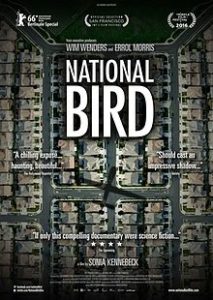
There are many subjects that should comprise a US citizen’s required reading – or in this case, viewing – list to make us aware and responsible members of our nation. National Bird, a documentary about the drone warfare program, should be on the list.
Drone warfare wreaks havoc on every life it touches. Not just the obvious victims of drone strikes and their surviving families, but also the US service members who work in the drone program as intelligence analysts and drone operators. National Bird shows the untold devastation of these automated weapons, belying the propaganda that touts drone warfare as an effective and safer alternative to manned warfare.
Of course, all warfare has catastrophic impacts. But drone warfare has been sold to the public like low-fat butter, promising all of the creamy benefits of regular militarized war, with less of the nasty side effects like soldier deaths, PTSD, civilian casualties, and erosion of our prized US freedoms. Each of these issues, of course, has been a hidden casualty of the drone program, and National Bird makes this clear from the start.
The film follows three veterans involved in different aspects of drone warfare. A young intelligence analyst shares her story of being the only one of her friends in the program to dare to speak up about her PTSD and the misrepresentations of the program in the media and by politicians. All of her colleagues, she reports, are either drinking to cover their PTSD or joining the horrific statistic of the 22 veterans each day who commit suicide. Through her testimony, we learn of the callous disregard for human life exhibited by the Creech Air Force Base drone operators who fired on a caravan of civilians in Afghanistan despite having information that there were children, women, and probably non-combatants on board.
National Bird also follows the story of a woman who worked on the big data analyzing systems that provide live surveillance in the field. She raises the concern about the scope and size of these programs, and the impacts on freedoms and civil liberties. Film footage of a non-military drone’s view of our backyards and city streets brings this point home in a personal way. We travel with this veteran to Afghanistan where data becomes real people – the survivors of the massacre of civilians in the caravan mentioned above. We look into their eyes. We hear the widow’s heart-wrenching on-the-ground story. We see the amputated legs. We even witness a grainy but gruesome video segment of the victims being brought back to their village in dismembered and hardly recognizable pieces.
These images are hard to watch, but that is exactly why National Bird should be required viewing. Those of us who reap the dubious benefits of drone warfare should be excruciatingly clear about the weapons being used in our names. They are not clean. They are not painless. They are not video games. National Bird is a reminder that ignorance does not excuse us from our culpability in these bombings.
The third story highlighted in the documentary is a young man whose job remains undisclosed due to its top secret classification. However, we can guess that it was important, since the FBI raids his home and threatens him with charges of violating the Espionage and Sedition Act. He hasn’t done anything wrong. He isn’t a whistleblower. But he fits their profile of one, and engages in political activism (the right of every US citizen and one of the prized freedoms we’re seemingly always fighting to protect). The raid and investigation are aimed, he says, to silence his activism and send a warning to other potential whistleblowers.
Truth is dangerous. As we see in the film, those who tell the truth are silenced, marginalized, and suppressed. Dissent, truth, transparency, privacy are all untold casualties of the War on Terror and the drone warfare program.
The information in this documentary should serve as a reminder that the drone warfare program is not a “better war” replacement to regular warfare. Its statistics may look rosier than any other type of war, but there is no comparison between drones and the viable alternatives to war that include de-escalation of tensions, peace processes, diplomacy, conflict resolution, non-military interventions, and the obvious, but least discussed option of ending US imperialistic wars. In National Bird several people state that “drone warfare is here to stay”, but that it needs a massive overhaul and the valid concerns raised by both military and civilians need to be addressed. Whether you are working for an overhaul or an end to the drone warfare program, National Bird shows that the current system is not what it’s touted to be, and that the costs of the program are real and devastating.
Put this documentary on your viewing list. It is a must-see.
_________________
Author/Activist Rivera Sun, syndicated by PeaceVoice, is the author of The Dandelion Insurrection and other books. www.riverasun.com